TEL AVIV — The Israeli military’s’ raid at Gaza’s main hospital has entered its second week, with the IDF saying it has killed over 170 militants and detained hundreds of others in an operation that has raised questions over the fate of civilians sheltering at the site — and over Hamas’ ability to retake areas that Israel said it had cleared.
Israeli forces launched what the Israel Defense Forces described as a “high-precision” raid at Al-Shifa Hospital in Gaza City one week ago, alleging once again that the facility was being used as a Hamas hub, while fighting was also reported in recent days at two other medical facilities in the southern city of Khan Younis.
The IDF said all of those killed and around 500 people detained in the operation were Hamas and Islamic Jihad militants, though they did not provide evidence to support those claims. They also said they had located weapons and “terror infrastructure” within the hospital.
The raid has left much of Al-Shifa in ruins, with some of the walls that remain intact spattered with blood and civilians describing mass arrests.
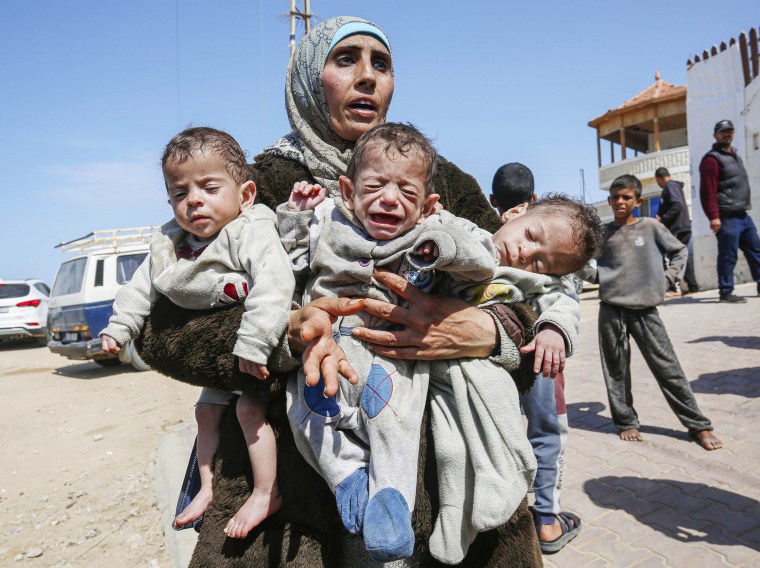
Hamas said last week that displaced civilians sheltering at the facility were among those killed, without providing evidence, while the Palestinian Health Ministry in Gaza said that at least five patients had died due to lack of food, water and health services. Others, it said, were in increasingly poor condition, “and worms began to emerge from their wounds.”
And one Western military analyst told NBC News that the renewed operation at Al-Shifa was likely an inevitable result of Israel’s shift in focus to the south, where it is preparing for an offensive the U.S. and international leaders have warned against.
Daniel Byman, a senior fellow at the Center for Strategic and International Studies and a professor at Georgetown University’s School of Foreign Service,said it would be the “least surprising surprise” if Hamas militants had been using Al-Shifa Hospital as a base in recent weeks, with Israel’s attention turned largely toward a possible ground invasion of Rafah in Gaza’s south.
Inside Al-Shifa
Much of what exactly has been happening on the ground at Al-Shifa and in the area of Al-Amal Hospital in southern Gaza remains unclear. NBC News’ crew on the ground has had limited access to both sites due to fighting and NBC News wasn’t able to reach medical workers at the hospitals or the Palestinian Ministry of Health in Gaza over the past week.
Video captured by NBC News’ crew, including on-camera witness accounts, have provided a glimpse into the chaos that has unfolded at the hospital compound over the past week, however.
In footage captured by the crew on Saturday, buildings could be seen destroyed around the Al-Shifa medical complex as blasts rang out and smoke rose in the distance. Days earlier, video showed some of the destruction inside Al-Shifa, with several rooms blown out, their walls reduced to rubble and others riddled with bullet holes. In one room, what appeared to be a body shrouded in blankets lay on the floor.
Multiple witnesses on Saturday provided NBC News’ crew with similar descriptions of being ordered by Israeli forces to exit areas of the hospital. Some said they were forced to remove their clothes outside on the medical facility’s grounds. The IDF has previously said the removal of clothes is “often necessary” to ensure detainees are not carrying weapons or explosives.
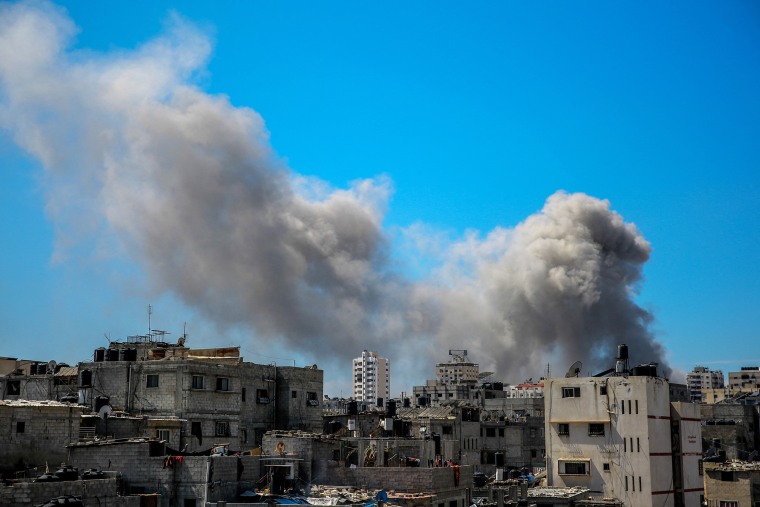
“It was raining on us and the cold was bitter,” said one man, who identified himself only as Mohamad and who NBC News has not identified further due to safety concerns. “They left us like that four to five hours.”
The man said soldiers then tied his hands and covered his eyes, before leading him and others into a room where they were left for hours before once again being taken outside. Some people were arrested, Mohamad, 36, said. “Some people were executed. Some people, of course, were released.” Asked to respond to his claim about people being “executed,” the IDF referred NBC News to a general statement about its operations at Al-Shifa Hospital.
Another witness, Abu Muhammad Alnajar, said patients and doctors were among those arrested. “I saw them with my own eyes. They arrested sick people as well as doctors,” he said.
The IDF said on Sunday that a large number of the people it apprehended were militants involved in the planning and execution of Hamas’ Oct. 7 attacks, and accused Hamas militants of barricading themselves inside the wards of Al-Shifa and firing mortars at its forces, causing damage to the hospital’s buildings.
Hamas last week said it was targeting Israeli forces around the compound, sharing footage appearing to show its members blowing up an armored vehicle. NBC News was not able to independently verify the footage.
Separately, a witness described tanks and armored bulldozers plowing into the hospital courtyard, crushing ambulances and civilian vehicles — as well as the bodies of people killed in the raid, according to The Associated Press.
NBC News’ crew last week also encountered two boys running from the direction of Al-Shifa wearing only their underwear. They said they were ordered by what appeared to be a drone to remove their clothes before being allowed to flee the hospital area.
Despite emphasizing the “high-precision” nature of its raid, the IDF drew scrutiny when it shared a photo montage on Thursday of militants it said it had detained during the assault, before admitting a day later that the montage identified militants who had not yet been caught, but were believed to be operating in the area of the hospital. The IDF attributed the mistake to human error.
In a statement on Friday, World Health Organization Director-General Tedros Adhanom Ghebreyesus said his team had received reports from a doctor at Al-Shifa of at least 50 health workers and 143 medical patients being forced to remain in one building during the raid “with extremely limited food, water and only one nonfunctional toilet.”
Ghebreyesus condemned the conditions patients were living under as “utterly inhumane” and called for an “immediate end to the siege.”
The IDF acknowledged that patients were moved to a “designated compound” in the hospital in what it said was a bid to “prevent harm to them.” On Saturday, it announced that it had facilitated the entry of “trucks full” of medical equipment and about two tons of food and three tons of water into the hospital. Asked to respond to a request for comment on the Palestinian Health Ministry’s allegations of five patient deaths, the IDF referred NBC News to the same statement. A spokesperson said they had no further comment.
On Sunday, the Palestine Red Crescent Society said the IDF had also stormed the Al-Amal and Nasser hospitals in Khan Younis, with the PRCS reporting “intense shelling and heavy gunfire” around the two medical facilities. The following night, it said Al-Amal had gone “out of service” after medical workers and patients were forced to evacuate the facility.
The IDF has said it is operating in the area of Al-Amal, but not at the hospital directly. It did not immediately respond to a request for comment on PRCS’s allegations hospital workers and patients being forced to evacuate the hospital.
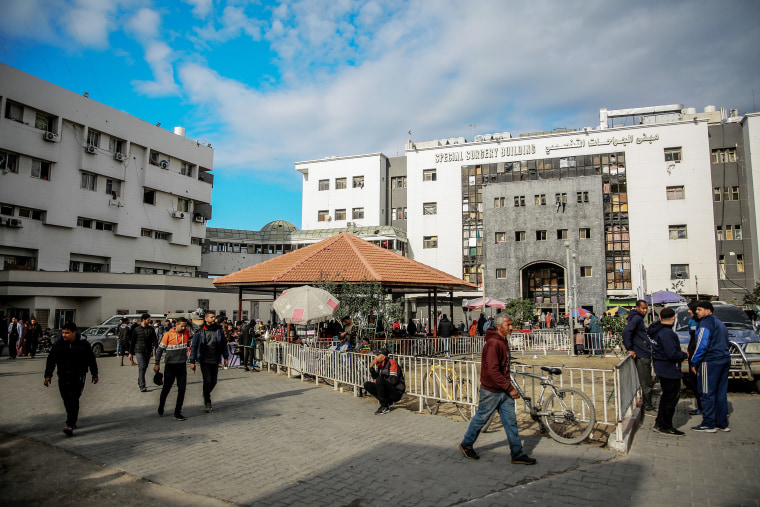
The IDF’s assault on Al-Shifa comes after it first raided the medical facility in mid-November, in a dayslong operation that saw thousands of displaced civilians sheltering at the hospital flee, alongside some medical workers and patients, including some who were critically ill.
At least 31 babies who were receiving care at the hospital also had to be evacuated from the facility in November. And the decomposing bodies of several infants were found weeks later. The gruesome discovery was cited in South Africa’s case against Israel at the International Court of Justice.
The IDF on Thursday acknowledged that its raid months ago had failed to lead to significant arrests of militant fighters, who it said had escaped, though it added its forces had found weapons and a tunnel system at the site.
An American intelligence assessment declassified in early January said the U.S. was confident militant groups used Al-Shifa Hospital to hold “at least a few” hostages seized during the Oct. 7 attack and to house command infrastructure, The Associated Press reported at the time.
“This time in a different way, we raided the complex by surprise,” IDF spokesperson Rear Adm. Daniel Hagari said Thursday. He added that Israeli forces “used trickery” in its latest operation at the hospital, but did not expand on how.
Byman had warned early on in October that the war was likely to become an ongoing “game of cat and mouse” if Israeli troops were to sweep through the enclave, leaving cleared areas in Gaza’s north largely unattended.
Byman said the IDF did not appear to be deploying a “clear, hold, build” approach, a counter-insurgency method that sees some troops remain in cleared areas to prevent the resurgence of an enemy force. But he also said that if Israel wants to prevent Hamas “or any other group from coming back, you need someone to govern. Someone to provide law and order.”
U.S. national security adviser Jake Sullivan appeared to offer similar criticism last week, saying that instead of focusing on stabilizing parts of Gaza that Israel has cleared to prevent Hamas from retaking territory, “the Israeli government is now talking about launching a major military operation in Rafah.”
Hagari said the Hamas and Islamic Jihad groups were both “severely damaged” as a result of the latest operation at Al-Shifa. Senior Hamas officials understood “very well the significance of the operation,” he said, and “as the picture becomes clearer, the pressure on them will increase.”

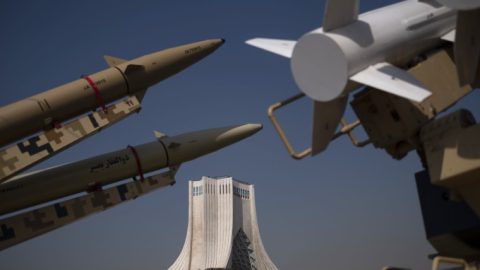
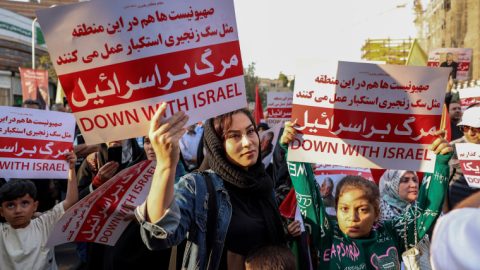

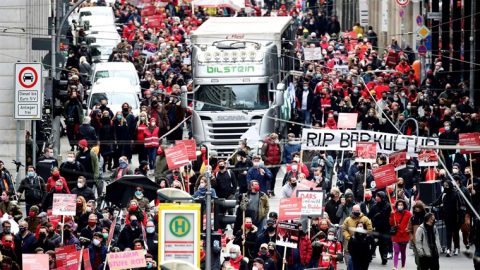
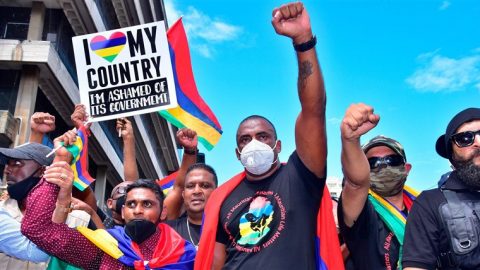
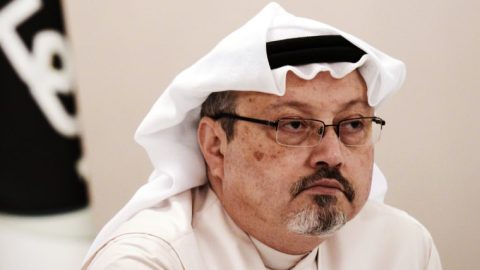
Recent Comments